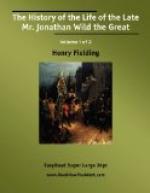“Most divine and ADWHORABLE creeture,—I doubt not but those IIs, briter than the son, which have kindled such a flam in my hart, have likewise the faculty of seeing it. It would be the hiest preassumption to imagin you eggnorant of my loav. No, madam, I sollemly purtest, that of all the butys in the unaversal glob, there is none kapable of hateracting my IIs like you. Corts and pallaces would be to me deserts without your kumpany, and with it a wilderness would have more charms than haven itself. For I hop you will beleve me when I sware every place in the univarse is a haven with you. I am konvinced you must be sinsibel of my violent passion for you, which, if I endevored to hid it, would be as impossible as for you, or the son, to hid your buty’s. I assure you I have not slept a wink since I had the hapness of seeing you last; therefore hop you will, out of Kumpassion, let me have the honour of seeing you this afternune; for I am, with the greatest adwhoration,
“Most deivine creeture, Iour most passionate amirer, Adwhorer, and slave, Jonathan Wyld.”
If the spelling of this letter be not so strictly orthographical, the reader will be pleased to remember that such a defect might be worthy of censure in a low and scholastic character, but can be no blemish in that sublime greatness of which we endeavour to raise a complete idea in this history. In which kind of composition spelling, or indeed any kind of human literature, hath never been thought a necessary ingredient; for if these sort of great personages can but complot and contrive their noble schemes, and hack and hew mankind sufficiently, there will never be wanting fit and able persons who can spell to record their praises. Again, if it should be observed that the stile of this letter doth not exactly correspond with that of our hero’s speeches, which we have here recorded, we answer, it is sufficient if in these the historian adheres faithfully to the matter, though he embellishes the diction with some flourishes of his own eloquence, without which the excellent speeches recorded in antient historians (particularly in Sallust) would have scarce been found in their writings. Nay, even amongst the moderns, famous as they are for elocution, it may be doubted whether those inimitable harangues published in the monthly magazines came literally from the mouths of the HURGOS, &c., as they are there inserted, or whether we may not rather suppose one historian of great eloquence hath borrowed the matter only, and adorned it with those rhetorical showers for which many of the said HURGOS are not so extremely eminent.
CHAPTER SEVEN
Matters preliminary to the marriage between Mr. Jonathan wild and the chaste Laetitia.




